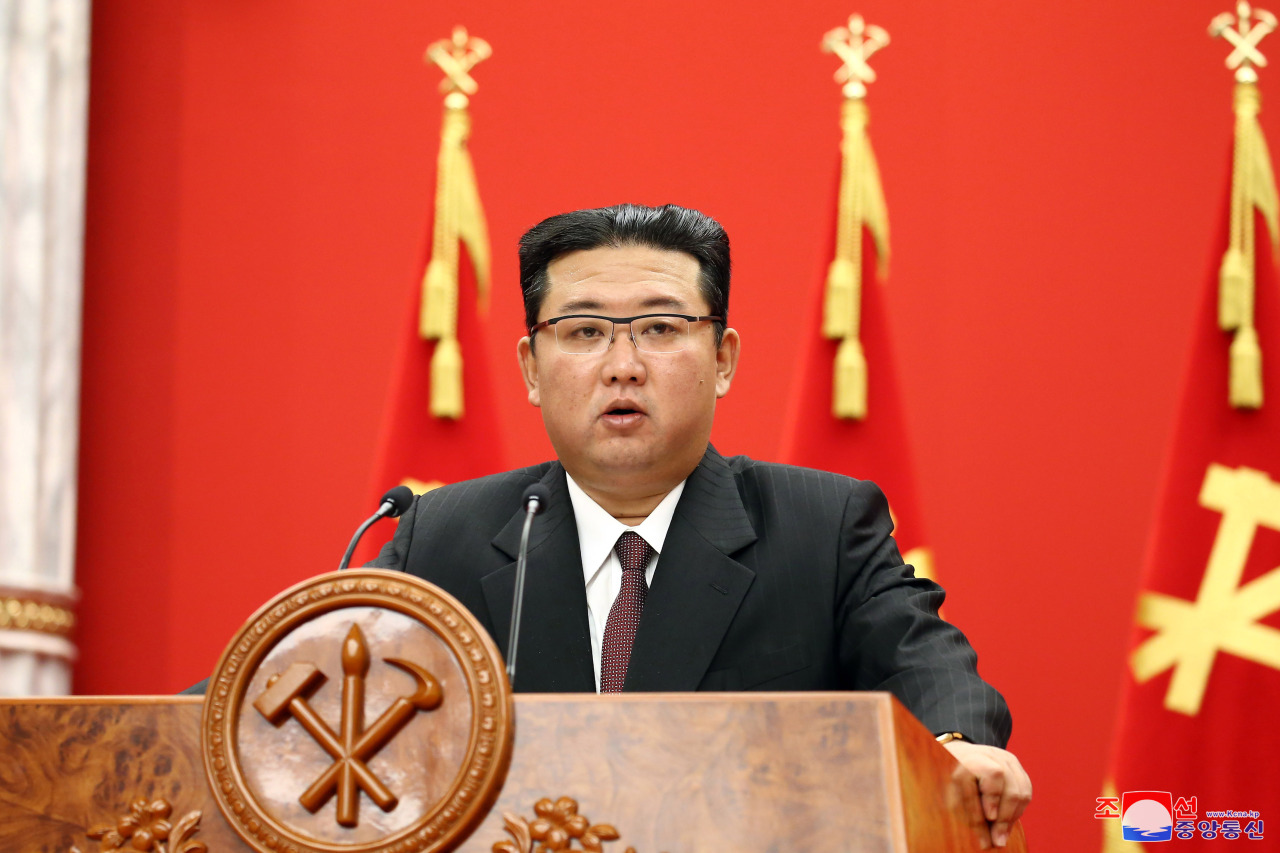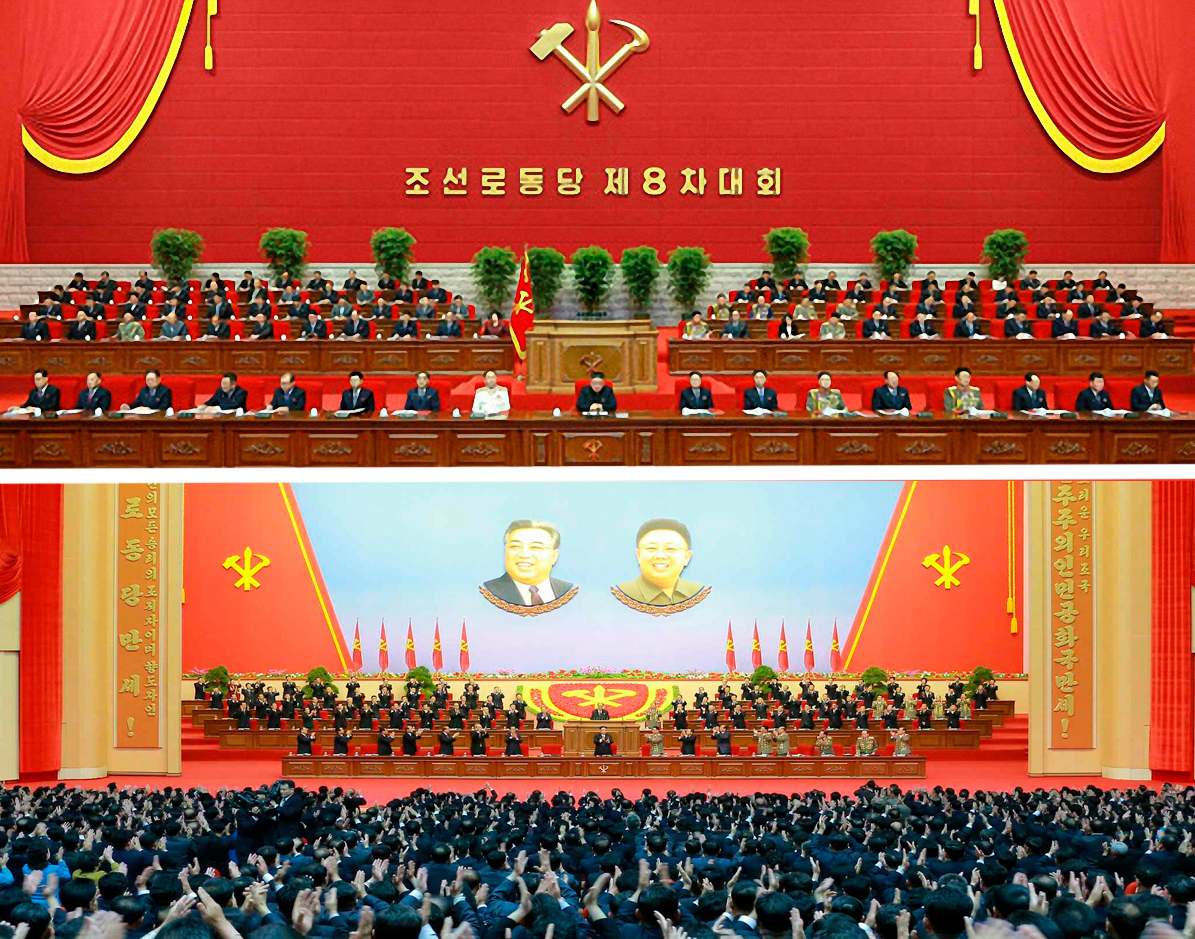 |
North Korean leader Kim Jong-un speaks at a lecture to commemorate the 76th founding anniversary of the ruling Workers` Party.(KCNA-Yonhap) |
 |
The ever-present portraits of Kim Il-sung and Kim Jong-il were absent from the backdrop at the eighth Party Congress in January. (KCNA-Yonhap) |
Kim’s confidence in power, achievements
Pyongyang’s initiative to establish a distinct ideology is also a manifestation of Kim Jong-un’s confidence in his achievements.
“In some ways, the emergence of Kim Jong-un-ism is also a congratulatory gesture to Kim Jong-un for having not only survived as Pyongyang’s leader, but also exceeded the expectations of the international community,” said Soo Kim, a policy analyst at the Rand Corp. and a former CIA analyst.
“This may also mean an even more emboldened Kim Jong-un.”
Cheong Seong-chang, director of the Center for North Korean Studies at the Sejong Institute, echoed similar views, saying Kim Jong-un-ism is a sign that Kim Jong-un is secure in his role.
“During his initial period in office, it was onerous for Kim Jong-un to suggest a ruling ideology that is discrete from the ones presented during the era of Kim Il-sung and Kim Jong-il.”
When Kim Jong-un inherited control in December 2011 after the sudden death of his father, he was largely overshadowed by his predecessors. The following year, the Kim Jong-un regime presented “Kim Il-sung-ism and Kim Jong-il-ism” as the sole “guiding ideology” of the Workers’ Party of Korea.
“The completion of the state nuclear force in 2017 raised his authority within the North Korean leadership and served as an opportunity for Kim Jong-un to make a complete escape from the halo of Kim Il-sung and Kim Jong-il,” Cheong said, adding that the completion of the nuclear force was a watershed for his leadership.
Why now? Economic challenges, expanded information access
Kim Jong-un-ism comes in time for the 10th anniversary of his ascension to power. But economic challenges have heightened the need to ramp up ideological campaigns to bolster Kim’s rule.
Gause, of CNA, raised the possibility that Kim Jong-un-ism is “tied to the legitimacy question which is under assault because of the failure in the economic plans.”
Kim Jong-un needs to play his cards right if he is to show his country that he is competent and has the right vision. Missteps in nuclear negotiations and the lack of economic progress have implications for his legitimacy.
The emergence of Kim Jong-un-ism could be linked to his goal of refocusing on economic growth while pulling away from or at least scaling back the country’s nuclear and missile programs.
“In order to do that without taking a major hit in terms of his legitimacy, he needs to have some other ideological elements that will mitigate the fallout of that shift because he will still be dealing with an economy that is heavily challenged,” Gause said.
Kim Jong-un-ism is also connected to the need to firm up ideological indoctrination and information, says Lee of the Institute of Foreign Affairs and National Security.
According to Lee, Pyongyang sees a need to “solidify Kim Jong-un’s monolithic ruling system as it has become difficult to control the people’s thoughts amid the deepening of informatization.”
In a broader context, North Korea has stepped up its large-scale nationwide ideological campaign to wipe out “non-socialist and anti-socialist practices” since the eighth Party Congress this January.
People-first, state-first principles
Still, Pyongyang appears to be in the stage of fleshing out Kim Jong-un-ism. It is likely to embrace the long-established Kim Il-sung-ism and Kim Jong-il-ism, demonstrate Kim Jong-un’s achievements, and bespeak his outstanding leadership as differentiated from that of his predecessors.
Experts also shared the view that the core ideas of Kim Jong-un-ism are the people-first and state-first principles.
“The people-first principle is suitable for winning the hearts of the public, given that it highlights the people as the main agents of the revolution,” Lee said, explaining that Pyongyang also added on the concept of patriotism by proposing the state-first principle.
“That is, this is the logic that people recompense the leader’s pursuit for love for the people with patriotism,” Lee said.
In addition, experts say Pyongyang could use Kim Jong-un-ism to appease the people amid the economic downturn.
“The underlying intention is to soothe antipathy toward the leader that could arise in the face of the prolonged COVID-19 pandemic and economic sanctions by highlighting Kim Jong-un as a people-friendly leader,” Kwak said, adding that the ideology could also be exploited to shift responsibility to party and government officials.
Mark Tokola, vice president of the Korea Economic Institute of America, said Kim Jong-un-ism, likely centered on the people-first principle, is the leader’s policy choice rather than a means to his ideological ends.
Tokola dismissed the view that Kim Jong-un was creating a distinctive ideology or modifying the eponymous Kim Il-sung-ism and Kim Jong-il-ism.
“Kim Jong-un’s rhetoric and motivations are now the same as those of any dictator trying to stay in power,” Tokola told The Korea Herald.
But in the long run, Kim’s emphasis on the people-first principle could jeopardize the regime’s survival, which has been the top priority of the Kim family.
“I would agree that he is putting the regime’s long-term survival at risk by saying that its purpose is to improve the lives of the North Korean people,” Tokola said. “If he fails to do that, it would undermine the regime’s legitimacy.”




![[Exclusive] Hyundai Mobis eyes closer ties with BYD](http://res.heraldm.com/phpwas/restmb_idxmake.php?idx=644&simg=/content/image/2024/11/25/20241125050044_0.jpg)
![[Herald Review] 'Gangnam B-Side' combines social realism with masterful suspense, performance](http://res.heraldm.com/phpwas/restmb_idxmake.php?idx=644&simg=/content/image/2024/11/25/20241125050072_0.jpg)

